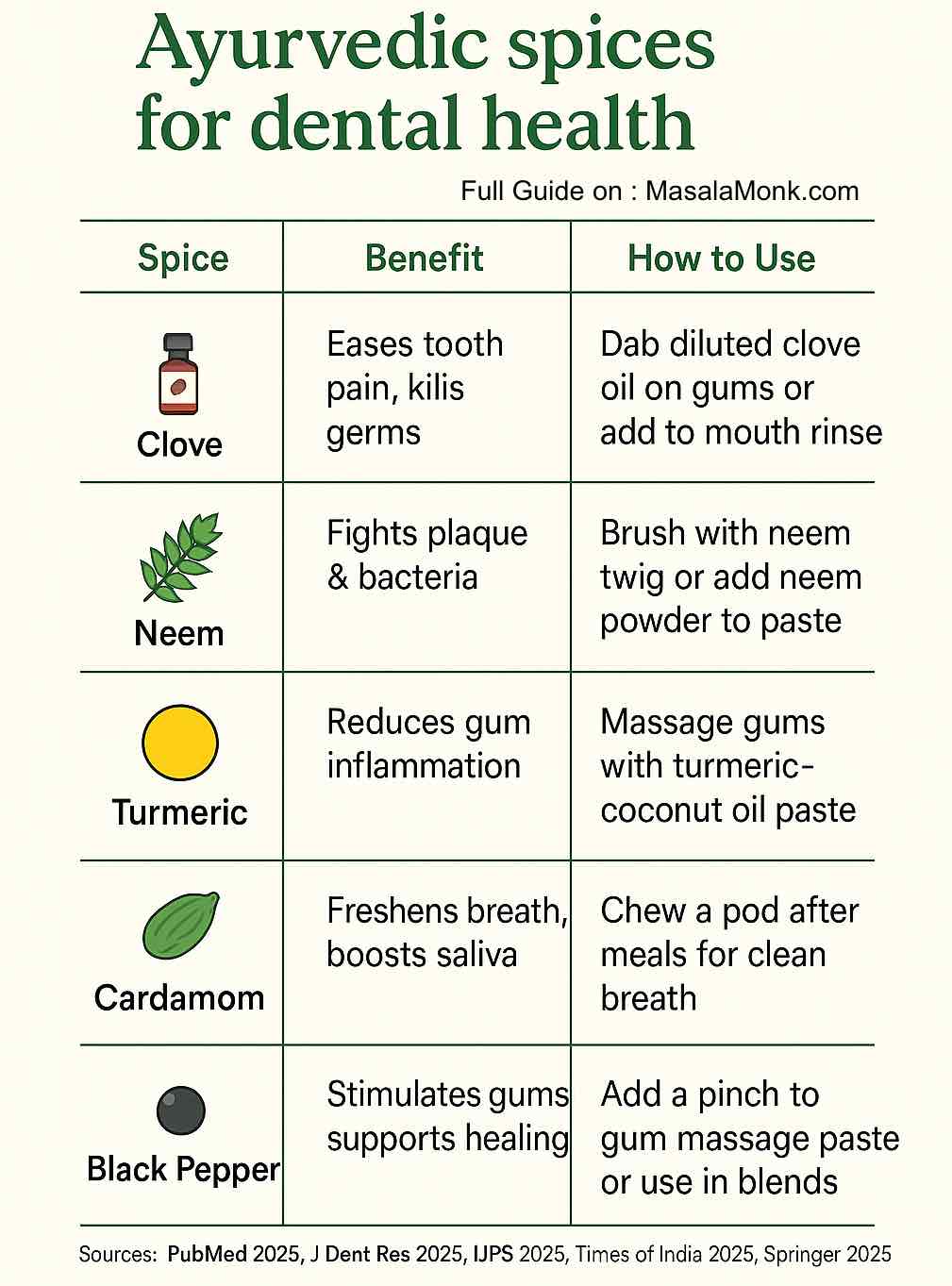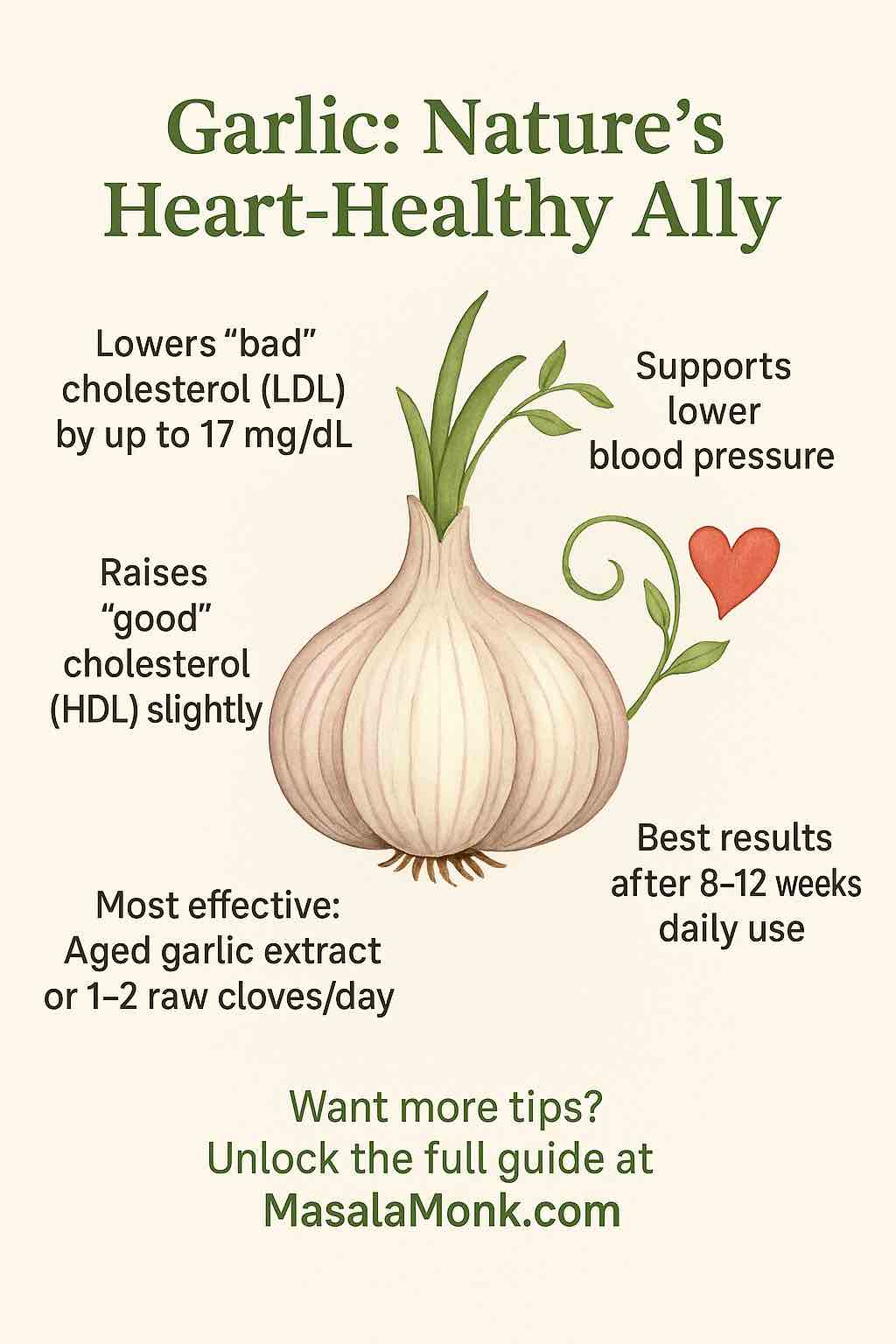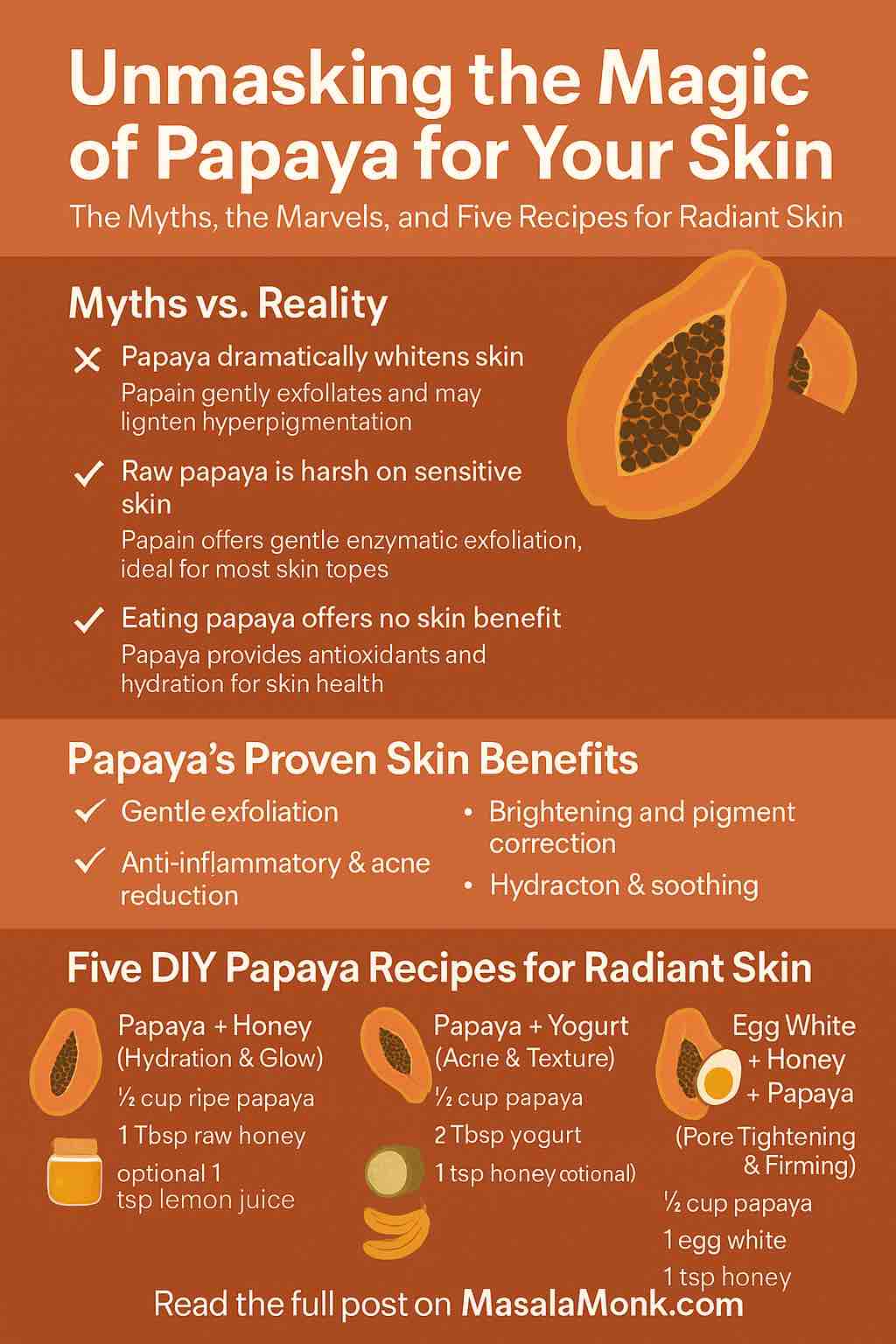
Modern dentistry has made amazing advances, but did you know that simple kitchen spices—some of which you may already have at home—are backed by centuries of Ayurvedic wisdom and cutting-edge science for supporting your oral health?
Ayurveda, the world’s oldest holistic healing system, has always given special importance to the mouth—not just as the gateway to the body, but as a vital source of balance for your overall well-being. Whether you’re dealing with sensitive gums, occasional toothaches, or just want fresher breath naturally, here’s how five powerful spices can enhance your dental care.
Let’s explore their ancient use, modern research, and most importantly: how you can practically use them in your daily routine.
1. Clove (Syzygium aromaticum): Nature’s Toothache Remedy
Ayurvedic Background:
Clove (Laung) has a legendary reputation in both Ayurveda and folk medicine. In ancient India, clove oil was prized for instantly relieving toothache and soothing inflamed gums.
Modern Evidence:
- A 2025 clinical trial in the Journal of Dental Research found that clove oil can reduce dental pain by nearly 40%—rivaling some over-the-counter remedies.
- Clove extract mouthwash significantly reduced rates of hospital-acquired oral infections in another hospital-based study.
How It Works:
The active ingredient, eugenol, is a potent natural antiseptic and anesthetic, making it invaluable for fighting oral bacteria and easing pain.
How To Use at Home:
- For instant relief, dilute one drop of clove oil (in a teaspoon of coconut oil) and apply to the affected tooth with a cotton bud.
- For fresher breath: Add a pinch of clove powder to a glass of warm water, swish, and spit.
- DIY Clove Mouthwash: Boil 4-5 whole cloves in water, cool, strain, and use as a natural rinse.
Caution:
Clove oil is strong—never use undiluted, and avoid if allergic or if you have open wounds in your mouth.
2. Neem (Azadirachta indica): The Ancient “Toothbrush Tree”
Ayurvedic Background:
If you grew up in India, chances are you’ve seen elders chewing on neem twigs (datun). Neem is legendary in Ayurveda for its “krimighna” (germ-destroying) properties.
Modern Evidence:
- Clinical trials in 2025 show neem gel and toothpaste can reduce plaque and gingivitis as effectively as leading medicated brands, but with fewer side effects.
- Neem’s antimicrobial properties have been shown to disrupt cavity-causing bacteria and reduce oral fungal infections.
How It Works:
Neem contains nimbidin and azadirachtin, compounds with potent antibacterial, anti-inflammatory, and healing effects.
How To Use at Home:
- Natural toothbrush: If you have access to organic neem twigs, peel and chew the end until it frays, then gently brush teeth and gums.
- Neem Powder Paste: Mix neem powder with water and a pinch of salt, brush gently, and rinse.
- Neem Mouth Rinse: Steep dried neem leaves in hot water, strain, cool, and swish for a minute.
Caution:
Neem is bitter! Use sparingly if new to it, and consult your dentist before replacing commercial products entirely.
3. Turmeric (Curcuma longa): The Golden Healer
Ayurvedic Background:
Turmeric, known for its brilliant color and deep healing reputation, is central in Ayurvedic wound care—oral wounds included.
Modern Evidence:
- A 2025 meta-analysis revealed that turmeric mouthwash and gels reduce oral mucositis (painful mouth sores) and help heal gum inflammation, with results comparable to leading medicated mouthwashes.
- Research is now combining turmeric with black pepper to boost its absorption and effect.
How It Works:
Curcumin, turmeric’s star compound, is anti-inflammatory, antibacterial, and accelerates healing of gum tissue.
How To Use at Home:
- Gum Rub: Mix ½ tsp turmeric powder with a little coconut oil to make a paste. Massage gently onto gums, let sit 5 min, then rinse.
- Turmeric Mouthwash: Add ¼ tsp turmeric powder to a cup of warm water, swish, and spit.
- Stain Warning: Turmeric is a powerful dye. Use a separate toothbrush and rinse your sink after use.
Caution:
Test a small amount first. If you notice any yellow staining on dental work, reduce use.
4. Cardamom (Elettaria cardamomum): The Ayurvedic Breath Freshener
Ayurvedic Background:
Cardamom is not just for chai! In Ayurveda, chewing cardamom pods after meals is a time-honored tradition to sweeten the breath, aid digestion, and uplift mood.
Modern Evidence:
- A 2025 Times of India feature highlights cardamom’s saliva-stimulating and odor-neutralizing powers.
- Cineole, an essential oil in cardamom, has documented antibacterial effects.
How It Works:
Cardamom stimulates saliva (which naturally cleans teeth), and its aromatic oils counteract odor-causing bacteria.
How To Use at Home:
- Simple Freshener: Chew on a whole green cardamom pod after meals—just spit out the husk.
- DIY Tooth Powder: Mix cardamom powder with a pinch of baking soda and use for gentle tooth cleaning.
- Natural Mouthwash: Crush 2 pods, boil in water, cool, and rinse.
Caution:
Rarely, cardamom can trigger allergies—start with small amounts.
5. Black Pepper (Piper nigrum): The Circulation Booster
Ayurvedic Background:
Black pepper has always played a supporting role in Ayurvedic mouth care—often blended with salt and other herbs for gum and tooth powders.
Modern Evidence:
- Piperine, black pepper’s bioactive compound, is proven to have mild antibacterial and anti-inflammatory effects.
- New research shows combining black pepper with turmeric significantly boosts turmeric’s absorption and effectiveness.
How It Works:
Black pepper increases saliva, gently stimulates gums, and its antimicrobial properties help control bacteria.
How To Use at Home:
- Gum Massage: Mix a pinch of black pepper powder with salt and a drop of coconut oil. Massage gently onto gums, then rinse.
- Boost Turmeric: When making turmeric paste or rinse, add a tiny pinch of black pepper.
Caution:
Pepper is strong—never use on irritated or bleeding gums. Always rinse thoroughly.
Bonus: Combining Spices for Synergy
Ayurveda often combines these spices for stronger effects. Try these combos:
- Neem + turmeric: For maximum antibacterial and healing effect (powder or rinse).
- Clove + cardamom: For instant freshness and pain relief (oil blend or chew).
- Turmeric + black pepper: Boosts curcumin’s bioavailability.
How to Start an Ayurvedic Oral Wellness Routine
- Morning: Oil pulling with coconut oil and a drop of clove or neem oil.
- After Meals: Chew cardamom or use a turmeric rinse.
- Before Bed: Gentle gum massage with black pepper-salt-coconut oil blend (if gums are healthy).
- Weekly: Use neem powder brushing and turmeric gum rub.
Pro Tip:
Start slow—introduce one spice at a time, and listen to your mouth. Always test for allergies or sensitivity.
Practical DIY Recipes
1. Turmeric-Clove Gum Soother
Mix ½ tsp turmeric powder, a pinch of clove powder, and a drop of coconut oil. Apply to sore gums for 5 minutes, then rinse.
2. Neem-Cardamom Mouth Rinse
Boil a handful of neem leaves and 2 crushed cardamom pods in 2 cups water for 5 minutes. Cool, strain, and use as a daily rinse.
3. Black Pepper Tooth Powder
Blend equal parts neem powder, turmeric, and a pinch of black pepper. Brush gently 2–3 times a week.
Important Cautions & When to See a Dentist
These natural methods are great adjuncts but not replacements for brushing, flossing, or regular dental checkups.
- Dilute all oils.
- Test for allergies before regular use.
- If pain or swelling persists, see a dentist!
Conclusion
Ayurveda’s natural wisdom is making a global comeback—and with good reason. The evidence for clove, neem, turmeric, cardamom, and black pepper is stronger than ever, showing that these age-old spices can play a supportive role in our modern oral wellness routines.
Whether you’re a fan of natural remedies or just looking for new ways to brighten your smile, these spices can offer simple, safe, and time-tested options for better dental health.
References & Further Reading
- Clove oil for dental pain: 2025 RCT
- Neem in oral gels: IJPS Journal 2025
- Turmeric for oral mucositis: PubMed 2025
- Cardamom: Times of India 2025
- Black pepper, bioenhancer: Springer 2025
What natural remedies work best for your smile? Share your thoughts below or ask your questions!
FAQs: 5 Natural Spices Used in Ayurveda for Dental Health, Teeth, and Oral Wellness
1. Can I use these spices instead of commercial toothpaste and mouthwash?
No. These spices are best used as adjuncts to modern dental care, not replacements. For optimal oral health, keep brushing twice daily with fluoride toothpaste and flossing. Natural remedies offer extra support.
2. Is clove oil safe for daily use on teeth?
Not recommended daily. Clove oil is potent and should be used for occasional pain relief or as part of a diluted mouthwash. Overuse may cause gum irritation or allergic reactions.
3. How do I make a safe neem mouth rinse at home?
Boil 5–7 neem leaves in 1 cup water for 5–10 minutes. Cool, strain, and rinse your mouth. Use 2–3 times a week to freshen breath and reduce bacteria.
4. Will turmeric stain my teeth yellow?
Rarely, but it can temporarily stain dental work or toothbrushes. Use in moderation, rinse thoroughly, and consider a separate toothbrush for turmeric-based remedies.
5. Are these spices safe for children’s dental care?
Generally, yes—but always consult a pediatric dentist first. Use milder dilutions and avoid strong essential oils for kids under 12.
6. How can cardamom help with bad breath?
Chewing a cardamom pod after meals stimulates saliva, which helps wash away bacteria. The aromatic oils also naturally freshen breath.
7. Is black pepper safe to use directly on gums?
Yes, in very small amounts, and never on broken or inflamed gums. Mix with coconut oil or salt for a gentler effect. Always rinse well and discontinue if irritation occurs.
8. How often should I use these natural remedies?
1–3 times a week is typical for mouth rinses or tooth powders. For issues like toothache or gum soreness, use as needed—but not as a substitute for professional dental care.
9. Are there any side effects or risks?
Possible mild irritation, allergies, or sensitivity (especially with essential oils). Always patch test before full use and discontinue if you notice discomfort or unusual symptoms.
10. Can I combine these spices in a single homemade oral-care recipe?
Yes! Many traditional remedies blend turmeric, clove, neem, and black pepper. Just keep proportions small and start with single-ingredient use to check for reactions first.













